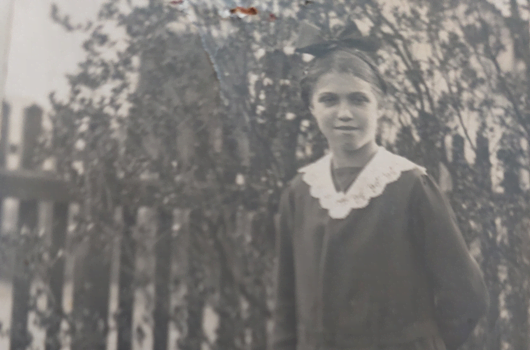The story of the British-born victims of the Nazi war on disabled people

Photograph of Ivy Angerer, one of the 13 British Born victims of Aktion T4.
Holocaust Memorial Day takes place on 27 January each year in the UK. The date marks the liberation of Auschwitz-Birkenau, the largest Nazi death camp.
The day is an opportunity for everyone to remember the millions of people killed in the Holocaust and Nazi persecution of:
- Jewish people
- disabled people
- gay and lesbian people
- Slavic people
- Polish people
- Black people
- Roma Gypsies, and
- political opponents.
We also remember genocides in Cambodia, Rwanda, Bosnia, and Darfur.
Exhibition and online event
In January 2025, Surrey History Centre will host an exhibition and a Zoom event telling the stories of 13 British Born victims of Aktion T4.
Aktion T4 was a Nazi programme that killed about 70,000 disabled adults. They were killed because they were mentally ill, learning disabled or otherwise disabled.
The Finding Ivy online event and exhibition will explore the lives of these 13 people and the meticulous research that has unearthed their life stories.
The online event will be led by the exhibition's curators, Dr. Helen Atherton from the University of Leeds and Dr. Simon Jarrett from the Open University. The event takes place on Wednesday 29 January 2025 at 5.30pm. Tickets are available on Surrey History Centre's website.
If you can't make the online event, the exhibition will be open throughout January at the Surrey History Centre.
Anna Elsie Panitza
Featured in the exhibition and online talk is Anna Elsie Panitza (Elsie), born in 1897 to an English mother and German father. At 14, she lived with Dr Ernest Trouncer and his wife in Surbiton. Records show she was admitted to Brookwood Asylum, Woking at 17, then to Netherne Hospital, Coulsdon.
Described as intelligent, yet often incoherent and delusional, she was first diagnosed with 'the insanity of adolescence.' Later, she was diagnosed with schizophrenia. After years of admissions, she was discharged in 1920. Her family, especially the Trouncers, remained devoted, even hiring a private nurse when needed.
In 1920, Elsie returned to Germany and married Georgi Panitza, a Bulgarian doctor. Yet, her mental health issues persisted. Between 1931 and 1939, she was institutionalised six times, diagnosed with schizophrenia. In 1940, as part of the Nazi T4 'euthanasia' programme, she was transferred to the Sonnenstein killing centre where she was murdered by gassing. She was 43 years old.
Elsie's medical case notes, held at Surrey History Centre, have filled important gaps in her story. To learn more about Elsie, visit Surrey History Centre's powerful, international exhibition throughout January or book a place on the Zoom event on Surrey History Centre's website.
More from heritage news
- What Keeps Us Well
- New additions to the Surrey History Centre archive in July
- Gypsy, Roma and Traveller History Month
- Surrey on film for VE Day
- Fairgrounds during the Second World War
- Surrey Heritage
- Historic Gertrude Jekyll garden plans donated to Surrey History Centre
- Women’s History Month 2025
- LGBT+ History Month 2025
- It’s South Asian Heritage month
- Local and Community History Month
